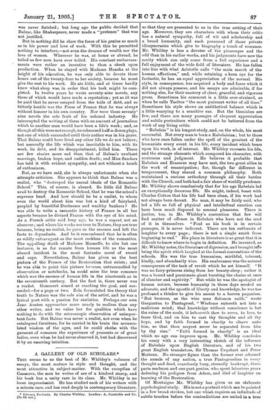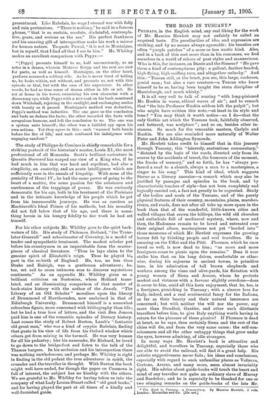This seems to us the best of Mr. Whibley's volumes
of essays, the most mature in style and thought, and the most attractive in subject-matter. With the exception of Casanova, the men he writes of are of a kindred stamp, and his book has a unity rare in its class. Mr. Whibley is no loose impressionist. He has studied each of his writers with a minute care, and has read deeply in contemporary literature,
• Literary Portraits. By Charles Whibley. London: A. Constable and Co. [7s. ttclnehl
so that they are presented to us in the true setting of their age. Moreover, they are characters with whom their critic has a natural sympathy, full of wit and scholarship and a broad humanity, and each possessed of those private idiosyncrasies which give to biography a touch of romance. Mr. Whibley is less a devotee of the picaresque and the odd than in his earlier works, and his judgments have now the sanity which can only come from a full experience and a full enjoyment of the wide field of literature. He• has fallen into line with what Aristotle calls " the main march of the human affections," and, while retaining a keen eye for the fantastic, he has an equal appreciation of the normal. His style, in consequence, has acquired a body and force which it did not always possess, and his essays are admirable, if for nothing else, for their mastery of clear, graceful, and vigorous
prose. Sometimes his comment is a little over-strained, as when he calls Tacitus "the most puissant writer of all time." Sometimes his style shows an antithetical balance which is a little wearying to a sensitive ear. But the blemishes are few, and there are many passages of eloquent appreciation and subtle portraiture which could not be bettered from the work of any living critic.
"Rabelais" is his longest study, and, on the whole, his most successful. Not every man is born a Rabelaisian ; but to those who have once fallen under the spell of the greatest of the humanists every event in his life, every incident which bears upon his work, is of interest. Mr. Whibley recounts his life, and the strange elements which composed his character, with acuteness and judgment. He believes it probable that Rabelais and Erasmus may have met, the two great allies in the work of emancipation ; for, though far different in temperament, they shared a common philosophy. Both maintained a curious orthodoxy through all their battles with the Church, and both had a fair share of worldly prudence. Mr. Whibley shows conclusively that for his age Rabelais led an exceptionally decorous life. He might, indeed, boast with Charles Cotton that his life had been clean, if his work had not always been decent. No man, it may be fairly said, who led a life so full of physical and intellectual exertion can have been much disposed to sensual pleasures. There is justice, too, in Mr. Whibley's contention that few will find matter of offence in Rabelais who have not the seed of it in themselves. "Foul as his book is in certain passages, it is never indecent. There are ten outbursts of laughter to every page ; there is not a single smirk from beginning to end." His place in literature is so great that it is difficult to know where to begin in definition. He invented, as Mr. Whibley notes, the literature of digression, and brought lute being the spirit which laughed at the formal conventions of the schools. His was the true humanism, mirthful, tolerant, kindly, and abundantly wise. His exuberance was the natural consequence of the task of revolt which be set himself. "It was no fairy-princess rising from her beauty-sleep ; rather it was a bound and passionate giant bursting the chains at once of slumber and captivity." But while he was the apologist of human nature, because humanity in those days needed an advocate, and the apostle of liberty and knowledge, he was too profound a thinker to give his assent to a barren paganism. "But beoause, as the wise man Solomon saith," wrote Gargantua to Pantagruel, " Wisdome entereth not into a malicious mind; that knowledge without conscience is but the mine of the soule, it behooveth thee to serve, to love, to fears God, and on him to cast thy thoughts and all thy hope, and by faith formed in charity to cleave unto him, so that thou mayest never be separated from him by thy sins." " Faith formed in charity" is an ideal which no age can improve upon. Mr. Whibley concludes his essay with a very interesting sketch of the influence of Rabelais upon English literature, and of his two great English translators, Sir Thomas Urquhart and Peter Motteux. No stranger figure than the former ever adorned the annals of any nation, a true Pantagruelian in ever; thought and deed, ceaselessly busy, eternally bankrupt, three parts madman and one part genius, who spent laborious years deducing his pedigree from Adam, and died of laughter on learning of the Restoration.
Of Montaigne Mr. Whibley has given us an elaborate psychological study. •His is not a portrait which can be painted in a few broad strokes, but one which requires an infinitude of subtle touches before the contradictions are united in a true
presentment. Like Rabelais, be wagel eternal war with folly and vain pretensions. "There is nothing," he said in a famous phrase, " that is so certain, resolute, disdainful, contempla- tive, grave, and serious as the ass." His perfect frankness and his amazing gift of introspection make his work a mirror for human nature. To quote Pascal, " it is not in Montaigne, but in myself, that I find all that I see in him." Mr. Whibley makes an excellent comparison with Pepys :—
" [Popp] presents himself to us, half unconsciously, as an actor in a drama, wherein Mistress Knipp and the rest are cast for parts, as well as himself. Montaigne, on the other hand, perforce assumed a solitary role. As he is never tired of telling us, he looks within, not without, and presents us, not with this episode or that, but with the sum of his experience. In other words, he had no true sense of drama either in life or art. He sat at home in his tower, examining his own character with a discerning eye, while Pepys with a new coat on his back sauntered down Whitehall, rejoicing in the sunlight, and exchanging smiles with beauty as it passed. Montaigne's method was deductive, Pepys's method was inductive. The one gave us the conclusion and bade us deduce the facts ; the other recorded the facts with scrupulous humour, and left the conclusion to us. The one was a system unto himself; the other was a faithful spy upon his own actions. Yet they agree in this : each warmed both hands before the fire of life,' and each confessed his indulgence with engaging candour."
The study of Philippe de Comines is chiefly remarkable for a striking portrait of the historian's master, Louis XI., the most professional of all Monarchs. Scott's brilliant caricature in Quentin Durward has warped our view of a King who, if he had much in him that was hard and repellent, had also a simplicity, an austerity, and an acute intelligence which are sufficiently rare in the annals of kingship. With none of the geniality of Henri IV., he bad the same power of going to the heart of a matter, the same passion for the substance and carelessness of the trappings of power. He was curiously democratic for his age, both in his treatment of the Parisians and in the intimate knowledge of his people which he got from his innumerable journeys. He was as careless as Machiavelli's Ideal Prince of his methods, but his morality did not fall below that of his age, and there is some- thing heroic in hie hungry fidelity to the work he had set himself.
For his other subjects Mr. Whibley goes to the quiet back- waters of life. His study of Philemon Holland, "the Trans- lator-Generall" and schoolmaster of Coventry, is a model of tender and sympathetic treatment. The modest scholar put before his countrymen in an imperishable form the master- pieces of classical literature. " Thus he lays claim to the genuine spirit of Elizabeth's reign. Thus he played his part in the re-birth of England. He, too, no less than Drake and Raleigh, was a. gentleman adventurer; he, too, set sail to cross unknown seas to discover mysterious continents." As an appendix Mr. Whibley gives us a brilliant criticism on Suetonius, whom Holland trans- lated, and an illuminating comparison of that master of back-stairs history with the author of the Annals. "The Library of an Old Scholar " moralises upon the library of Drummond of Hawthornden, now enshrined in that of Edinburgh University. Drummond himself is a somewhat colourless figure, more concerned with bibliography than life ; but he had a true love of letters, and the visit Ben Jonson paid him is one of the romantic episodes of literary history. Last comes the study of Robert Burton, Lamb's " fantastic old great man," who was a kind of cryptic Rabelais, finding that gusto in his view of life from his Oxford window which others get from mixing in the turmoil. He was very human for all his pedantry ; like his namesake, Sir Richard, he loved to go down to the bridge-foot and listen to the talk of the Thames bargees. In his seclusion and his introspection there was nothing unwholesome, and perhaps Mr. Whibley is right in finding in the old pedant the true adventurer in spirit, the crusader and the traveller in thought. With Burton the book might well have ended, for though the paper on Casanova is full of interest, the subject has no kinship with the others. We are grateful to Mr. Whibley for having taken us into the company of what Lady Louisa Stuart called " old good books," and for having played the part at all times of a kindly and well-furnished guide.







































 Previous page
Previous page